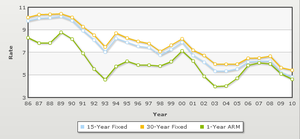There is much confusion these days with what’s really going on with our real estate market and the economy in general. I thought it might be a good time to address some of these concerns and hopefully clear up some uncertainty for my friends and clients. I’ll start with the economics as that will shed some light on the real estate market.
The economy in Canada is actually quite good. We haven’t been in recession for a couple of years now but that’s not obvious with the amount of bad news in the media. Part of the problem is that most people don’t know how to interpret what they’re hearing in the media and that assumes we’re getting correct information in the first place. The media does have a tendency to report as fact what is really just an educated opinion. That being said, what follows is also partly the opinion of yours truly.
Guidelines for Interpreting what I hear from the Media
First of all I consider the source of the information. The government and the banks are frequently truthful but they also have an interest in influencing the psychology of the populace. If it’s from a press release you can bet it’s been carefully picked over by the PR department. If it’s a direct quote from someone who knows what they’re talking about it’s more likely to be complete and reliable. I tend towards independent economists, particularly those who’ve previously held high positions within the government or banks but no longer have the constrictions of a bureaucracy.
Second I consider the jurisdiction of the market. The “Canadian Real Estate Market” is a useless reference. Real estate is so local that even the average price in a city is not terribly accurate if you’re considering one particular property. Prices can change from one street to the next so the “Canadian Market” does not really exist. The stock market on the other hand is global with a national tilt to the country where it’s located. The NYSE will affect us all but none more than the US. The TSX will affect Canada more than anyone else. Interest rates are national so they will affect the economy of the particular country they’re reporting about; same with inflation. So it’s important to remember what is going to affect you and the markets you’re involved in.
Considering the timeline of the things reported can be helpful too. For instance, real estate is not a liquid asset so it takes months for changes to take effect. Employment is usually the last factor to change in an economy and is therefore a good example of long term strength or weakness. Businesses need to see a change in their long term financial statements before starting cutbacks or expansion. The stock markets; however, are extremely liquid and can change significantly overnight. The media only reports what has already happened. The performance of the last quarter may have little relevance to the performance of the next quarter. Some markets (like real estate) also have seasonal cycles; real estate taking a dip in the fall is hardly news – it happens every year.
Predicting the Future
When predicting the future even the smartest have been less accurate in the last few years. I always want to know the causes that the expert is referencing to formulate their prediction. Anyone who is using only short term (meaning last few years) government and financial policy factors I don’t put much faith in. Long term history shows that we’ve had one depression and two major recessions every eighty years or so since the beginning of the industrial age. Look to the past for a pattern (the human aspect) and adjust for the things that have changed since the last time. The patterns we’ve seen in the last decade were the same as the 1920’s almost to a tee. However, there are also some major fundamental changes such as leaving the gold standard; the government can manipulate our currency now. Another is moving from the industrial age to the information age which has changed the control of the money supply.
Banks and Government no longer Control the Money
Due to technology moving so fast, information age corporations don’t usually invest in new technology unless it can pay for itself in six months to three years which equates to a 33-200% rate of return. The net result of this is that major corporations are flush with cash and need something to do with it. You’ve probably noticed in the last 10 years that every major business has a financing department or a store credit card. Large corporations now call each other for short term loans instead of asking the banks. In real estate this has manifested itself in the form of “securitizing” loans. Banks don’t have enough money to lend so they package up a group of mortgages and sell them off on the bond market. This was a major contributor to the housing crises in the US due to carelessness of the lenders and buyers of those assets. Lenders knew they weren’t keeping them and the federal government implemented policies to help even the least credit worthy (subprime) to realize the American Dream of owning a home. That combined with the demographic issues we’re a recipe for disaster.
Demographics and Debt
The two main causes of the state of our global financial situation are demographics and a massive amount of debt held by individual households and governments; although most major corporations have well balanced financial statements due to the phenomenon noted above. Globally, the majority of baby boomers have passed their spending peak. The economy cannot help but slow down from that. It was inevitable. Also, incredibly cheap debt in the last decade fuelled unequalled expansion (and in many cases bubbles) all around the world and the time has come to pay the pied piper.
As I said before, Canada is doing quite well. Only Germany has a stronger economy. Our suffering has and will be caused by the delinquencies of our neighbours in a global economy. The US has stabilized but is very vulnerable still to outside influences. Europe is where things may fall first. I believe we are likely to see the end of the European Union followed by the collapse of the weakest economies involved. This will have a domino effect across Europe and the rest of the developed world and finally the US. If this happens it will be the permanent end to the American empire. Canada will mostly feel the effects by having fewer customers to purchase our products. Exports will go down and business will have to cut back, unemployment will go up, wages will be cut. Default rates will increase causing drops in real estate and losses for the financial institutions, et cetera.
Deflation - Increased Spending Power
One of the biggest things that could hurt individuals in Canada is deflation. We’re all familiar with how inflation eats into our spending power but when it reverses to deflation the opposite happens: prices go down. Doesn’t seem so bad, right? But there’s a flip side. The house and RV you financed with cheap credit just dropped in value but you’re still repaying that debt with money that’s worth more and more as your assets fall faster them you can pay them off. Also, lower prices can eat into the profits of businesses causing cutbacks and layoffs. A lot of the rosy economic forecasts revolve around oil staying at or above $85 a barrel; I think we’ll see $40 at some point. I predict that most commodities will drop as demand for them decreases. Natural gas has already declined and is predicted to stay low. Deflation can destroy an economy just as surely as inflation. This is why Alberta is the place to be – lots of jobs plus lower prices equals a good standard of living.
This is a good time to refer back to the jurisdiction factor. If Alberta is doing well and the rest of the world is sinking we could see inflation in real estate but prices for fuel, food, and utilities could drop. Interest rates might go up but employment will be okay. Foreign investment may continue to flood in but the stock and commodities markets will take a dive.
Our Real Estate Market
Alberta is in a unique position to survive all of the things that are plaguing the world’s economies. As I’ve said, the two fundamental issues is demographics and out of control debt levels. In Alberta we have a very young population. People don’t come here to retire they come here to work, resulting in the majority of our population being aged between 20 and 45. Those are peak earning years. We also have very low government debt. There are also some other perks like we have the lowest taxes in Canada and our low population of elderly will make less strain on our health care system than in other provinces. Also, we have two major cities that are in the sweet spot for real estate growth. Cities between 750,000 and one million tend to grow quite quickly as they are big enough to offer most of the benefits of a big city but are still small enough that they don’t have issues of a big city such as traffic congestion and really high density. This combination results in a higher growth rate than smaller or larger cities.
All this combines to make Alberta the place to be for the next decade. If there were no other factors to consider I think that Alberta’s economy would be stable as our fundamental strength battled foreign weakness; however, there’s one more phenomenon. There are lots of people in all those faltering economies that have vast sums of cash and are looking for somewhere to invest it. They are already turning to Alberta; we’ve had billions in foreign investment flooding in and it will only pick up if things get worse elsewhere.
Interest Rates
Banks set their prime rate based on the overnight lending rate set by the Bank of Canada (currently 1%). The government uses this to stimulate or retard the economy and I believe they will have reason to keep it low until the worst of the global deleveraging is over or about 2-3 years.
Fixed rates are based on the bond market where mortgages are securitized. The bond market is the “safe” place to invest your money when everything else is volatile. As such the last while of record low interest rates are due to volatility elsewhere causing a glut of capital available in the bond market. As global economies recover much of that cash will depart to other investments that have higher returns and interest rates will go up. Again I think we’ve got 2-3 years of low rates ahead after which we’ll see rates return to 5.5 – 6%.
Why we love Alberta (even if it's cold)
Fundamentally, Alberta is the model of a free market system fulfilling its potential. We would be booming again if the rest of the world was doing okay but we’re going to have to settle for normal growth instead. Whatever happens, we’re going to do better than the rest of the world. If they crash, we may stand static until they’ve finished dropping. If they do better than expected, we may see a small boom return. Likely, we’ll see moderate growth until things work themselves out globally and the rest of the world deleverages which should take until the end of the decade. In real estate this will mean a 2.5-5% growth rate per year; during inflation of 2.5% that’s not so good but if we see deflation of 2.5% you can add that to your returns.
I'd love to hear your comments on this one.

















